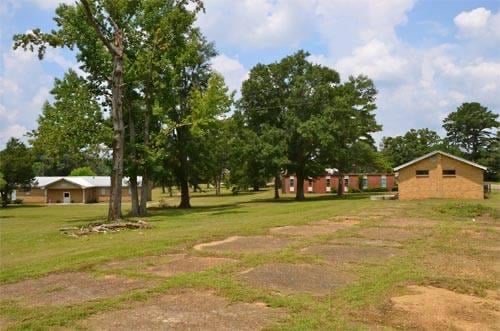The Prentiss Normal and Industrial Institute was founded by Mississippi natives and visionaries Jonas Edward “J.E.” Johnson and Bertha LaBranche Johnson. Over a century ago, Prentiss Institute opened its doors to African American youth searching for formal education but barred from attending white-run schools. It is one of the oldest educational institutions for African Americans in The Magnolia State.
From 1907 to 1989, the Institute gained international recognition by nurturing and educating the spirits, minds, and bodies of students who returned home to serve and uplift their communities.
Prentiss Institute closed its doors as an educational facility in 1989 because of decreased enrollment. However, it remains a vital community center that provides space to community organizations, groups, and families.

The Prentiss Institute Trustee Board and the Prentiss Partnership Team are made up of individuals across the country who are committed to the mission of Prentiss Institute and its complete restoration as a venue that serves the community interests.
“Everyone on this board is connected to this building somehow,” said Gary Bass, the Director of Economic Development for Jefferson Davis County. “The Prentiss Institute is a huge asset here. I see nothing but potential. I see a property that could create jobs and provide teaching opportunities (again) while also providing business opportunities.”
With a vision in place, and a plan to partner with the local school district, Bass wants to use the cafeteria space as a place to teach culinary arts while simultaneously utilizing the science building as a learning space to teach agriculture, creating an opportunity to provide a farm to table experience while also teaching the art and science of growing your own food.
Bass believes that Jefferson Davis County is “the garden spot of the earth” and is passionate about putting the region on the map and branding it as such.
The Prentiss Institute is a 40-acre campus that is 5,000 yards from The Natchez Trace, and many people only know it exists if they drive a particular route that goes by the historic property.
“We have worked on making the property more visible by clearing some trees so that it can be seen from Prentiss Main Street and also by obtaining signs and historical markers that not only mark the space as a historical building but also honor it,” Basee continued.
The library doors of the Institute were closed in 1989, and Bass shared, “If you walk in there, it’s like a time capsule. Everything was left just as it was when they shut doors in 1989.”
Bass said he’d like to see the library utilized as a literacy center for young readers and adult readers who may need additional help with reading intervention. “There is so much potential within these buildings; they just need to be resurrected and revitalized.”
One building on the campus of The Prentiss Institute has been revitalized, the historic Rosenwald Building. The landmark Rosenwald Building was built on the campus of Prentiss Institute in 1926 with funds from the Julius Rosenwald Rural School Building Program.
The Prentiss Institute Board of Trustees completed the restoration of the building in 2013. The Rosenwald Building is listed on the National Register of Historic Places and has been recognized as a landmark by the Mississippi Department of Archives and History.
A Rosenwald school was the first school building for African American students in a Southern community. Rosenwald schools allowed students and teachers to move out of churches, barns, or fields.
Out of the original 557 schools aided by the Rosenwald Fund in Mississippi, only a handful are known to have survived, and the Prentiss Institute in Jefferson Davis County houses one of them.
Interestingly, several modern schools today model this particular Rosenwald’s (1926) H-plan form.
The Rosenwald Building now serves as a hub for community activities and events. It is available for various activities, including conferences, meetings, expos, banquets, receptions, reunions, performances, weddings, and more.
Bass, The Prentiss Institute Trustee Board, and the Prentiss Partnership Team, as well as several other community members and statewide stakeholders, are actively working towards revitalizing the rest of The Prentiss Institute so it can stand as an institution of learning, unity, and economic strength for everyone.